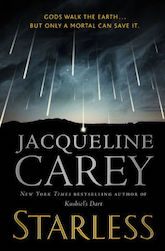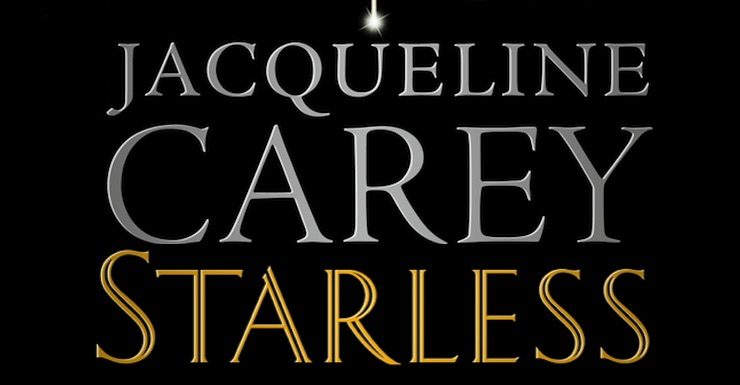Jacqueline Carey’s fantasy novels have never been less than ambitious. Her work includes the acclaimed Terre d’Ange novels (beginning with Kushiel’s Dart in 2001); a dark epic fantasy duology that has been compared to Lord of the Rings but from the villain’s point of view in Banewreaker and Godslayer; urban fantasy involving ancient gods in the Agent of Hel trilogy (Dark Currents and sequels); and post-apocalyptic dystopia in Santa Olivia and Saints Astray. Lush, detailed, sweeping, and open about sexuality and attraction, Carey’s work is almost always worth reading.
Starless is her latest novel, an epic fantasy story told in a single volume. A single relatively compact volume, in epic fantasy terms. It’s ambitious in the narrative it sets out to tell, which marries coming-of-age and self-discovery with an epic threat to the future of… well, everything… and even if it doesn’t completely succeed in its ambitions to balance these two kinds of story, it’s an excellent book.
Although, on reflection, perhaps the lack of weight given to the world-ending threat is part of the narrative’s ambitions. Perhaps Carey’s focus on the emotional journey of a single individual—and their relationship with their destined other half—in the face of a threat to the future of the world is Starless‘s point.
This review includes mild spoilers.
Buy the Book


Starless
Born during a lunar eclipse, Khai is destined from birth to serve as a protector (a shadow) to Zariya, the youngest princess of the House of the Ageless, a royal family also known as the Sun-Blessed, rulers of the realm of Zarkhoum. Trained in killing and stealth by a sect of warrior-priests dedicated to the service of Pahrkun the Scouring Wind in the deep desert, Khai spends most of his youth unaware that he was what we’d refer to as “assigned female at birth,” and that the Brotherhood of Pahrkun raised him as a boy from expediency.
Prophecy has it that one of the Sun-Blessed and their Shadow will be instrumental in helping against a great darkness that will rise in the western seas. When Khai arrives at court at the age of sixteen to meet his soul’s twin, he learns that hardly anyone there believes in the prophecy, and no one believes that Zariya is the prophesied Sun-Blessed. Not only is she the youngest and least-regarded daughter of the royal house, but she survived a childhood illness that means she can only walk with difficulty and the aid of crutches.
The first part of the novel, “The Desert,” is based around Khai’s childhood and training, the three very different men who mentor him, and his struggle in reconciling the earliest principles of honour that the Brotherhood teaches him with the training in stealth, assassination, and poisons that his first mentor decides he needs: to go from honour to the idea of “honour beyond honour.” The second part of the novel, “The Court,” centres on Khai when he comes to court and becomes Zariya’s shadow officially, as they navigate court intrigue and problems tied to Miasmus, the darkness in the west, and as Khai begins to negotiate slightly more complicated feelings about his gender, presentation, and friendship/attraction to Zariya. The third part of the novel, “The Sea,” casts Khai and Zariya out into the wider world, where they encounter a small band of prophecy-seekers (and sometime pirates) and find themselves at the heart of a desperate quest to prevent Miasmus’s rise from destroying the world. Khai can’t protect Zariya from everything—not from having to adjust to a world in which it doesn’t really matter that she’s a princess, not from the threat of death, and not from the travails that Zariya must endure on an island where everything can kill you in order to unlock her abilities as the prophecy-chosen Sun-Blessed.
For an epic fantasy novel, the weight of the narrative seems slightly off-balance: told from Khai’s perspective, the book spends more time on his development as a person, and his relationships with other people, than the quest element which is more commonly the most prominent part of an epic fantasy. I confess I really enjoyed this choice. It makes the world-ending threat and quest elements of the classic epic fantasy feel fresh and new again.
Khai’s complicated negotiation of his self-image and his feelings about Zariya also make Starless feel fresh. It’s not often that you come across an epic fantasy where the main character can be described as nonbinary—even if Khai keeps using masculine pronouns. Even less often does one read a novel where a main character—Zariya, in this case—must deal with physical disability and concomitant issues with both self-image and other people’s prejudices. The hope of a magical cure is held out to Zariya several times in the course of the novel, but while some of her symptoms are alleviated, she never stops needing crutches to walk.
Carey’s characters feel real and alive, and her world is lush and well-realised. This is an excellent novel. I recommend it.
Starless is available from Tor Books.
Read an excerpt from the novel here.
Liz Bourke is a cranky queer person who reads books. She holds a Ph.D in Classics from Trinity College, Dublin. Her first book, Sleeping With Monsters, a collection of reviews and criticism, was published in 2017 by Aqueduct Press. It’s a finalist for the 2018 Locus Awards and is nominated for a Hugo Award in Best Related Work. Find her at her blog, where she’s been known to talk about even more books thanks to her Patreon supporters. Or find her at her Twitter. She supports the work of the Irish Refugee Council and the Abortion Rights Campaign.










